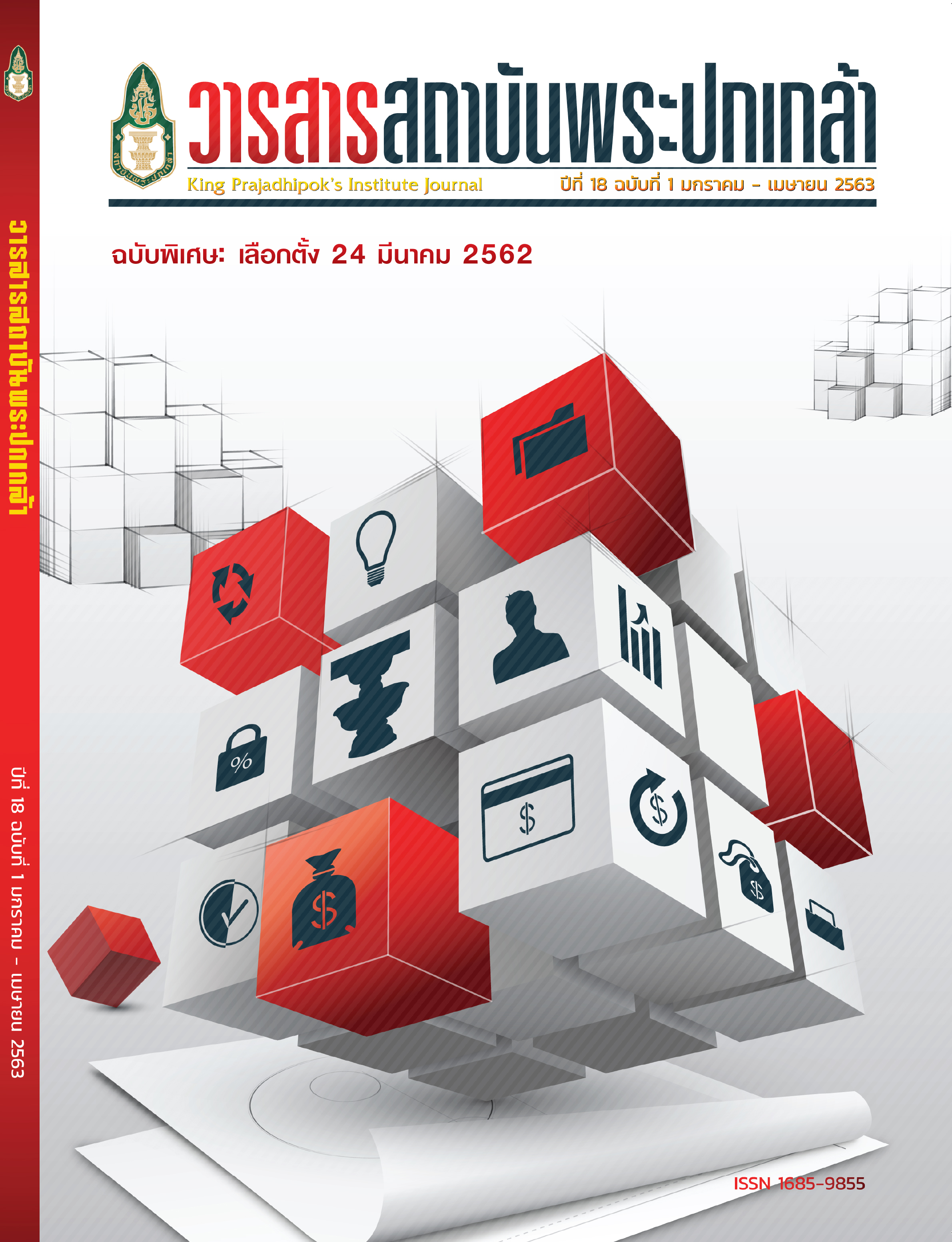Voting Behaviors and Political Campaigns in the 2019 Thailand General Election, Roi Et Province
Main Article Content
Abstract
The study of political competition and activities in Roi Et Province during Thailand’s 2019 general election reveals that the number of outstanding candidates in each constituency produced multiple levels of competition. In terms of political campaigns,vote canvassing and vote-buying still exist in various forms. The factors that instead have a more powerful influence on people’s choices include policy competition, learning from the ideological struggle throughout a decade of Thai political conflict, economic growth, and concerning the political situation at that time. Furthermore, the online platform was an excellent opportunity to create space in the election campaign, facilitating reduced costs and limitations for candidates in many ways. These modern technologies are used in campaign management to link, expand, and strengthen networks. The election results show that most of the candidates from the Pheu Thai Party were elected, yet open area politics characterize the political landscape of Roi Et Province. In particular, the coming local elections will play an essential role in recruiting and supporting local political candidates.
Article Details
@ 2020 King Prajadhipok's Institute The Government Complex Commemorating All Right Reserved.
References
โกวิท อ่อนประทุม. ผู้สมัครสมาชิกสภาผู้แทนราษฎรจังหวัดร้อยเอ็ด เขต 1 พรรคพลเมืองไทย. (20 พฤษภาคม 2562). สัมภาษณ์
จำรัส สรสาร. ผู้สมัครสมาชิกสภาผู้แทนราษฎรจังหวัดร้อยเอ็ด เขต 2 พรรคอนาคตใหม่. (20 พฤษภาคม 2562). สัมภาษณ์.
จิรวรรณ สิทธิศักดิ์. ประธานผู้นำอาสาพัฒนาชุมชนจังหวัดร้อยเอ็ด. (31 พฤษภาคม 2562). สัมภาษณ์.
จิราพร สินธุไพร. ผู้สมัครสมาชิกสภาผู้แทนราษฎร จังหวัดร้อยเอ็ด เขต 5 พรรคเพื่อไทย. (8 กรกฎาคม 2562). สัมภาษณ์.
ตวงรัตน์ วงศ์เวไนย. ผู้สมัครสมาชิกสภาผู้แทนราษฎรจังหวัดร้อยเอ็ด เขต 4 พรรคพลังประชารัฐ. (18 เมษายน 2562). สัมภาษณ์.
ทวีวัชรวงศ์ นาเมืองรักษ์. ผู้สมัครสมาชิกสภาผู้แทนราษฎร พรรคเศรษฐกิจใหม่ เขต 5 จังหวัดร้อยเอ็ด. (26 พฤษภาคม 2562). สัมภาษณ์.
นภาพร พวงช้อย.ผู้สมัครสมาชิกสภาผู้แทนราษฎร จังหวัดร้อยเอ็ด เขต 1 พรรคประชาธิปัตย์. (3 มิถุนายน 2562). สัมภาษณ์.
นิรมิต สุจารี. ผู้สมัครสมาชิกสภาผู้แทนราษฎรจังหวัดร้อยเอ็ด เขต 3 พรรคเพื่อไทย. (28 พฤษภาคม 2562). สัมภาษณ์.
ประจักษ์ ก้องกีรติ. (บรรณาธิการ). (2555). การเมืองว่าด้วยการเลือกตั้ง : วาทกรรม อำนาจและพลวัตชนบทไทย. กรุงเทพฯ: ฟ้าเดียวกัน.
ปุณณ์ปวีร์ เขตวิจารณ์. ผู้สมัครสมาชิกสภาผู้แทนราษฎร พรรคเศรษฐกิจใหม่ เขต 3 จังหวัดร้อยเอ็ด. (26 พฤษภาคม 2562). สัมภาษณ์.
สนทนากลุ่มผู้นำชุมชน เขตเลือกตั้งที่ 4 อำเภอทุ่งเขาหลวง จ.ร้อยเอ็ด. (2 มิถุนายน 2562).
สนทนากลุ่มผู้นำชุมชน เขตเลือกตั้งที่ 7 อำเภอเกษตรวิสัย จ.ร้อยเอ็ด. (16 เมษายน 2562).
สมเกียรติ ชัยคณารักษ์กูล. อดีตประธานหอการค้าจังหวัดร้อยเอ็ด. (24 พฤษภาคม 2562). สัมภาษณ์.
สัมพันธ์ บุตรพรม. ผู้สมัครสมาชิกสภาผู้แทนราษฎรจังหวัดร้อยเอ็ด เขต 5 พรรคเสรีรวมไทย. (17 พฤษภาคม 2562). สัมภาษณ์.
สุรพงษ์ แสงเรณู. อาจารย์ประจำสาขาวิชารัฐศาสตร์ คณะนิติรัฐศาสตร์ มหาวิทยาลัยราชภัฏร้อยเอ็ด. (1 พฤษภาคม 2562). สัมภาษณ์.
อรรถสิทธิ์ พานแก้ว และคณะ. (2562). รายงานผลเบื้องต้นของการสำรวจ: การเลือกตั้งและทัศนคติต่อประชาธิปไตย และการเมืองไทยของผู้เลือกตั้งครั้งแรก (First-time voters). สืบค้นจาก http://www.polsci.tu.ac.th/fileupload/529/900.pdf
อรอนงค์ ซ้ายโพธิ์กลาง และศรัณย์ จิระพงษ์สุวรรณ. (2558). นักการเมืองถิ่นจังหวัดร้อยเอ็ด. กรุงเทพฯ: สถาบันพระปกเกล้า.
Anyarat, C. (2010). Thai Electoral Campaigning: Vote-Canvassing Networks and Hybrid Voting. Journal of Current Southeast Asian Affairs, 29(4), pp. 67-95.
Erlano, L & Gadaingan, Kr, (Eds). (2016). Electoral Challenges in Asia Today. Bangkok: The Asian Network for Free Elections: ANFREL.
Jordan, J. (2017). The Effect of Electoral Competitiveness on Voter Turnout. Retrieved from https://cedar.wwu.edu/wwu_honors/43
Kitschelt, H. and Kselman, D. (2012). Economic Development, Democratic Experience, and Political Parties’ Linkage Strategies. Comparative Political Studies, 46 (11), 1453–1484.
Norris, P. (2004). Electoral Engineering: Voting Rules and Political Behavior. New York: Cambridge University Press.


